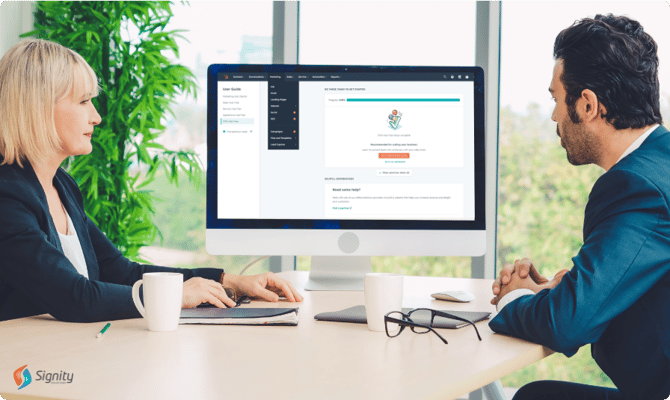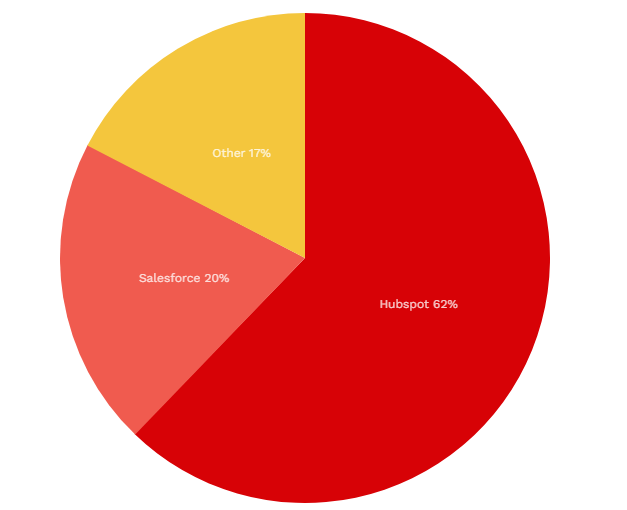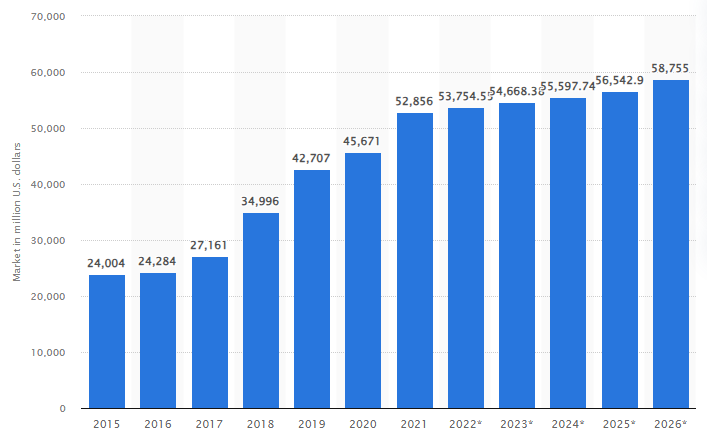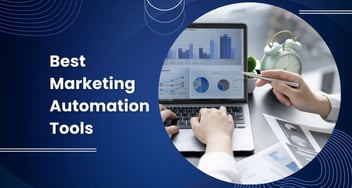Introduction to HubSpot CRM: Features, Benefits and Plans
For good reasons, HubSpot is among the most popular customer relationship management platforms. With its marketing tools, scalable sales and excellent customer support, it’s right for your business to grow. Discover how to use a CRM and take your team to the next level.

From capturing and tracking leads to seamlessly integrating emails and automating processes, HubSpot CRM provides all the essential tools to effectively manage your sales process and cultivate enduring relationships with your customers.
We know it can be bothersome to choose to invest in a CRM when you’re apprehensive about its benefits for business.
With a focus on streamlining sales and marketing processes, HubSpot CRM offers a range of features, benefits, and plans designed to help organizations build and maintain strong customer relationships while driving growth.
So, let’s start by understanding what defines a HubSpot CRM!
Key Takeaways:
|
What is HubSpot CRM?
HubSpot CRM is a cloud-based platform that integrates marketing, sales, content management, and customer service tools into a unified database. This makes it easier for businesses to manage customer relationships effectively.
HubSpot CRM provides functionalities such as contact management, sales automation, pipeline management, email tracking and templates, reporting and analytics, and seamless integration with other HubSpot tools.
It is known for its user-friendly interface, flexibility, and scalability, making it an attractive solution for businesses of all sizes seeking to streamline their sales and marketing efforts while building enduring relationships with their customers.
Did You Know!
“HubSpot CRM has been adopted by 30,000+ companies across 90 countries”.
HubSpot CRM - Your Road to Success
It’s a well-known fact business services are primarily praised and criticized because of customer expectations.
Financial concerns and short-term business goals often face challenges because they don’t meet customer expectations. And as a consequence, they fail to deliver an unparalleled customer experience. So, if the customer experience is your alarming concern and you intend to offer them the best solution, HubSpot CRM is your safe bet.
Statistics for Websites using CRM Technologies
Hubspot is currently the most popular technology in this category with a share of 62% as of currently updated data.

After all, CRM is the heart of the business. It represents customer relationship management, and you have the best CRM. This is because CRM helps make wise decisions, organize the details of prospects and customers, and much more. Furthermore, it helps to scrutinize your business process and boost its growth.
The global customer relationship management (CRM) software market is forecast to grow to 57 billion U.S. dollars in size in 2025. This is a projected increase of almost four billion U.S. dollars from 2021, at a compound annual growth rate (CAGR) of 2.1 percent.

Source - Statista
These amazing numbers portray the fad of HubSpot CRM in the business world. Nonetheless, its customer-centric approach is all that cements its footsteps. It consists of their personal information, link social media profiles, complete purchase history, behavior patterns, past interactions, and much more.
Top HubSpot CRM Benefits
Here are the top benefits of using HubSpot CRM:
-
Centralized Database: HubSpot CRM consolidates prospect information in one place, streamlining access for quick cross-team collaboration and efficient management.
-
Enhanced Customer Understanding: Access a comprehensive view of each customer, enabling personalized communication by storing vital information like contact details, social media, and job titles.
-
Effortless Communication Management: Seamlessly manage internal and external communication within the CRM, allowing reps to track interactions, follow-ups, and resource distribution.
-
Automated Data Entry: Time-saving automation collects and aggregates information, updating deals and stages automatically, ensuring efficient data management.
-
Follow-up Reminders: CRM tracks prospect activity, providing reminders for follow-ups, optimizing the timing for meaningful interactions, and increasing conversion chances.
-
Organized Contact Data: Easily organize and retrieve contact data, track buyer journey stages, and log interactions, making information searchable and readily available.
-
Segmentation Capabilities: Utilize criteria-based sorting to create targeted contact lists, empowering tailored outreach strategies for higher conversion rates.
-
Robust Sales Reporting: Generate insightful sales reports and dashboards to manage pipelines, track performance, set goals, and forecast sales, aiding strategic decision-making and scaling processes.
Benefits of Using HubSpot CRM for Your Business
HubSpot offers a variety of benefits, enhancing customer relationship management, team collaboration, sales optimization, and informed decision-making.
Comprehensive Business Expansion
Contrary to the misconception of being solely an email platform, HubSpot offers a suite of enterprise-grade marketing and sales applications. Its true strength lies in seamless integration across various functions, enabling scalable business growth.
Marketing Automation for Growth
Marketing automation is pivotal for business growth. With HubSpot's tools like Workflows and Sequences, personalized communications can be sent to a vast audience based on stored CRM data. This automation not only nurtures leads but also streamlines administrative tasks, allowing teams to focus on business scalability.
In-Depth Analysis and Reporting
Integration with HubSpot Hubs grants access to powerful analysis and reporting tools. Businesses benefit from dynamic analytics, empowering data-driven decision-making. Features include:
-
Website Performance Metrics: Insights into website performance metrics like traffic, bounce rate, and conversion rate.
-
Pipeline Reporting: Clear visualization of the sales pipeline, enabling optimization and improvements.
-
Revenue Forecasting: Predictive tool aiding in forecasting future revenue based on current performance.
Choosing HubSpot gives businesses a competitive edge, ensuring efficient and effective goal achievement.
What You Get With the HubSpot CRM
HubSpot's base free plan provides a robust CRM, enabling companies to store customer information, manage deals, and cultivate relationships. With space for up to 1,000,000 contacts and unrestricted users or customer data, the base plan supports contact and deal management, email tracking, marketing email creation, meeting scheduling, live chat support, and sending sales quotes to potential buyers.
-
CMS Hub: Seamlessly manage websites and leverage inbound marketing tools for campaign optimization and lead capture. Smart Content enables dynamic audience segmentation.
-
Marketing Hub: Advanced automation tools for lead nurturing, segmentation, and workflow management. Features include lead capture forms, email automation, and attribution reporting.
-
Sales Hub: Automation for sales pipeline management with a focus on deal stages. Enhances collaboration between sales and marketing teams with performance dashboards and integrated calendars/emails.
-
Service Hub: Comprehensive view of customer interactions with integrated automation for surveys and ticket assignments. Key features encompass ticketing, knowledge base, and service performance dashboards.
-
Operations Hub: Provides tools for streamlining and automating manual processes across teams. Enhances efficiency by syncing data, automating workflows, and unifying customer data across systems, ensuring smoother operations and better decision-making.
Should You Invest in HubSpot?
Yes, if you want to maximize revenue and sales today!
HubSpot pricing models vary from the free CRM version that includes a million contacts, landing pages, live chat, and some basic email marketing tools to the Enterprise level Growth suite that consists of all of HubSpot’s core tools and all four hubs.
So, if you are still on the fence about deciding, you are perplexed about which package is right for your business. HubSpot offers such an extensive array of tools that it becomes daunting to decide which hub you’ll get the most value and which package you’ll need.
-
Free! Free! Free - CRM Plan
HubSpot’s free CRM plan is an excellent choice for small businesses and startups looking to get started with CRM. As aforementioned, this plan offers basic contact and deal management and an untold number of integrations and add-ons. Plus, businesses can manage up to 1,00,000 contacts and companies, making it an easy-to-scale solution for growing businesses.
-
Paid Plans - Their Features
HubSpot’s paid plans provide a wide range of features developed to help businesses optimize their sales, marketing, and customer service processes. These plans are:
-
The Starter Plan
The starter plan starts from $50/month, which includes features like email marketing, ad management, and basic automation.
-
The Professional Plan
This plan costs $1,781/month, including advanced automation, custom reporting, and A/B testing capabilities.
-
The Enterprise Plan
The Enterprise plan starts from $5,000/month and adds advanced reporting, predictive lead scoring, and custom event triggers.
Ready to leap?
Integrate HubSpot with Your Existing Tech Stack
HubSpot will certainly replace the functionality of some of your already existing SaaS products, systems, and processes. Although it can also integrate with a wide range of apps and platforms, you can keep systems important to your business and easily integrate them with HubSpot.
This is where HubSpot connoisseurs come into the picture. They help you audit your present tech stack, identify gaps in your system and processes, and then recommend to you which plan and product is right for your organization.
Remember, adding HubSpot to the blend can help you get more out of your current systems. By introducing a single-truth approach for all your domains, HubSpot can centralize data for your organization and simplify processes throughout your business.
Finally
HubSpot’s marketing automation tools have proved to be a game changer for businesses. And, to make the most of these powerful tools with your existing tools, all you require is experience.
To achieve this, you need a partner you can trust, a partner who is a HubSpot-certified partner and training company. This means we can help you with all the skills needed to get up and running with HubSpot ASAP!
Ready to unleash the power of HubSpot to work for you? Just spin your flywheel with us and see how HubSpot magic works to help you achieve undefeatable success.
Frequently Asked Questions
Have a question in mind? We are here to answer.
What is HubSpot CRM?
![]()
HubSpot CRM is a cloud-based customer relationship management (CRM) software that helps businesses keep track of customers and prospects along with managing customer interactions. It offers numerous features, including lead tracking, contact management, sales pipeline management, and email marketing.
What are the benefits of using HubSpot CRM?
![]()
HubSpot CRM can help businesses streamline their sales and marketing processes by providing a centralized repository for customer data. Besides, it can also help businesses track customer journey from lead progress and sales opportunities, to automating tasks such as email marketing and customer follow-up.
What are some of the integrations that HubSpot CRM offers?
![]()
HubSpot CRM integrates with several other popular business applications, including Salesforce, Google Analytics, and Mailchimp. These integrations can help businesses streamline their workflows and improve their overall efficiency.


%201-1.webp?width=148&height=74&name=our%20work%20(2)%201-1.webp)


.png?width=344&height=101&name=Mask%20group%20(5).png)








.jpg?width=352&name=HubSpot%20Marketing%20Automation%20Guide%20(1).jpg)








